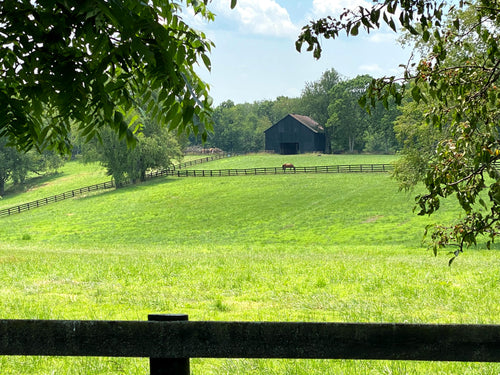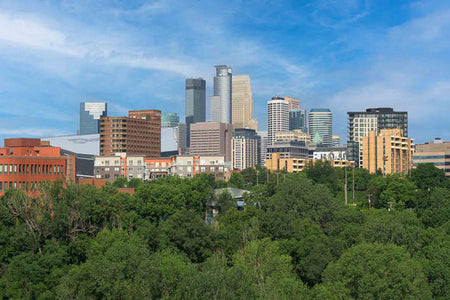Living in Kentucky means experiencing the beauty of all four seasons, but it also means dealing with the challenges of seasonal allergies. From the blooming flowers in spring to the falling leaves in autumn, each season brings its own set of allergens that can trigger uncomfortable symptoms for many residents. By knowing what triggers your allergies, you can take proactive steps to minimize exposure.
Below we’ll dive into everything you need to know about the allergy season in Kentucky. Below we discuss which time of year is the worst for pollen allergies in Kentucky and a breakdown of the allergen species in each region of the state.
Kentucky Allergy Seasons
It's essential to understand the common allergy triggers in Kentucky to better prepare for the season.
Spring
Spring in Kentucky is a beautiful time of year, with colorful flowers blooming and trees coming back to life. However, this season is also notorious for high pollen levels, especially from trees like oak, maple, and birch. These pollen grains can easily be carried by the wind, triggering allergies in many individuals.
Summer
Summer in Kentucky brings warmer temperatures and longer days, perfect for outdoor activities. However, grass pollen levels tend to peak during this season, leading to increased allergy symptoms for those sensitive to grass pollen. Mold spores also thrive in the warm and humid conditions of summer, adding to the allergen load.
Related: Summer Allergies Guide
Fall
As the leaves change color and temperatures start to drop, ragweed becomes a major allergen in Kentucky. Ragweed pollen can travel long distances, leading to widespread allergy symptoms. In addition to ragweed, mold spores from decaying leaves and other vegetation can also trigger allergies during the fall season.
Winter
Winter in Kentucky may bring relief for some allergy sufferers, as pollen levels are typically lower during this season. However, indoor allergens like dust mites, pet dander, and mold can still cause problems for those with year-round allergies. Keeping indoor spaces clean and well-ventilated can help reduce exposure to these allergens.
Exploring Allergens Across Kentucky's Regions
When it comes to allergies, the region you live in can have a significant impact on the types of allergens you are exposed to. Kentucky, known for its diverse landscape and varying climates, experiences unique allergy patterns across different regions within the state.
Western Kentucky
In Western Kentucky, where the climate is more humid and mild, common allergens include ragweed, grass pollen, and mold spores. These allergens can trigger allergic reactions such as sneezing, itchy eyes, and congestion in individuals living in this region.
Eastern Kentucky
Eastern Kentucky, characterized by its mountainous terrain and cooler temperatures, sees a different set of allergens. Tree pollen, particularly from oak and hickory trees, is a major allergen in this region. Additionally, mold spores from damp environments can exacerbate allergy symptoms in Eastern Kentucky residents.
Central Kentucky
Central Kentucky, with its rolling hills and fertile soil, experiences a mix of allergens from both Western and Eastern regions. Pollen from grasses, trees, and weeds can trigger allergies in individuals living in Central Kentucky. Additionally, mold spores from decaying vegetation are common allergens in this region.
KentuckyAllergy Season FAQ
Here are some frequently asked questions about allergy seasons in Kentucky:
What is the typical allergy season in Kentucky?
Allergy season in Kentucky typically starts in early spring, around late March to early April. This is when trees start to bloom, releasing pollen into the air. The season can last through late spring and into early summer, depending on the specific allergens in the air.
What causes allergies to flare up in Kentucky?
Kentucky's allergy season is primarily triggered by pollen from trees, grasses, and weeds. The humid climate in the state provides the perfect environment for these allergens to thrive, leading to increased symptoms for allergy sufferers.
What are common allergy triggers in Kentucky?
Common allergy triggers in Kentucky include ragweed, grass pollen, and tree pollen. These allergens can cause symptoms such as sneezing, congestion, itchy eyes, and coughing in allergy sufferers.
Which regions in Kentucky are most affected by allergies?
According to research, the regions in Kentucky most affected by allergies are Louisville, Lexington, and Bowling Green. These areas tend to have higher pollen counts and mold spore levels, leading to increased allergy symptoms among residents.
When do grass allergies peak in Kentucky?
Grass pollen allergies tend to peak in late spring to early summer in Kentucky. This is when grasses release pollen, triggering symptoms like sneezing, itching, and congestion in susceptible individuals.
What about ragweed allergies in Kentucky?
Ragweed is a common allergen in Kentucky, with its peak season typically occurring in late summer to early fall. Ragweed pollen can travel long distances, causing allergies even in urban areas.
Customized Allergy Treatment at Home
Using multiple over-the-counter allergy treatments is not ideal for getting through allergy season in Kentucky. Skip the drugstore and get a personalized all-in-one allergy treatment from the comfort of your home.
Allermi is a customized allergy nasal spray designed by experienced, board-certified allergists to solve your unique seasonal allergy symptoms. The Allermi formula is backed by science to give you the most effective allergy treatment for your individual allergy symptoms.
The best part? Allermi nasal spray is easy to use and delivered to your door in Kentucky.









